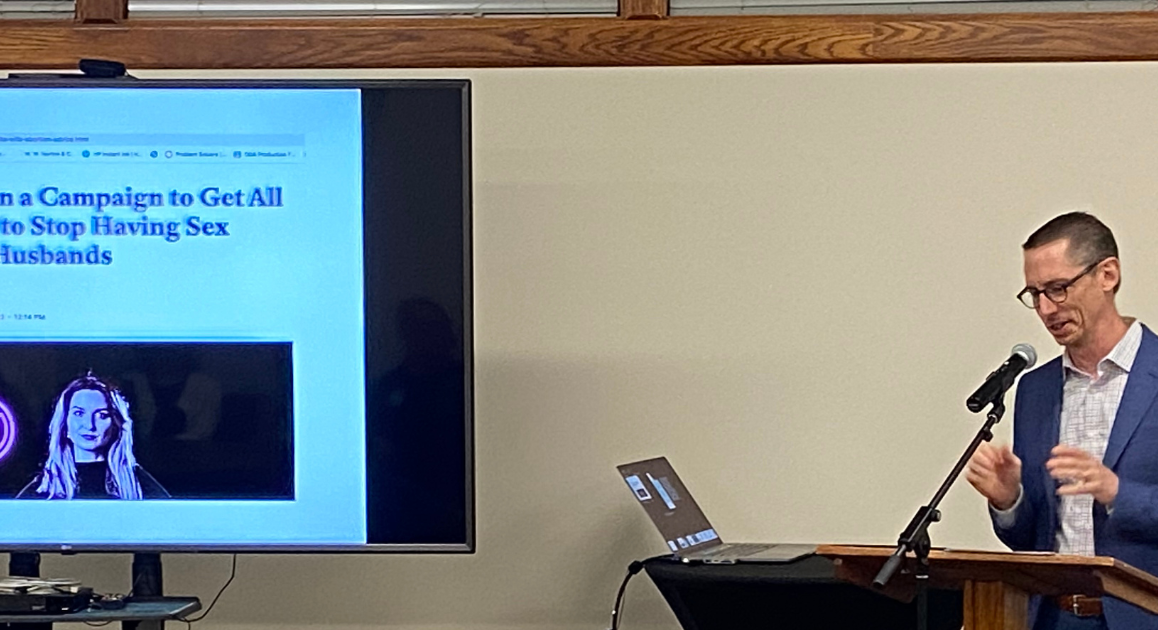Professor Mark Regnerus, a leading sociologist of human sexuality at the University of Texas – Austin, delivered an important lecture at Focus on the Family this week addressing the state of sexual politics in a post-Roe culture. In his presentation, Dr. Regnerus explored a remarkable and seemingly counter-intuitive angle to this topic: Why are gay and trans activists such a presence in abortion protests following the Dobbs decision?
Regnerus asked, “What’s up with that? What does abortion have to do with inherently infertile relationships?” Why indeed are we seeing so many rainbow flags linked to abortion protest? It is a very good question.
Professor Regnerus explained it’s because people who identify as “LGBT” actually make great use of abortion it turns out. And this is because that alphabet soup is increasingly made up of people who have plenty of potentially baby-making heterosexual sex. And this is true by remarkable margins.
Regnerus cited research showing “that today LGBT identification is running twice as high as sexual behavior” among those who claim to be so-called “LGBT.” That means fewer and fewer people who say they march under the rainbow flag are actually same-sex attracted or trans. He adds, “In other words, there has been a leap in LGBT self-identity among young adults whose behavior remains heterosexual.”
Yes, what you think LGBT is, and what it is being sold as, is no longer what it actually is.
Regnerus quotes from a Canadian social scientist who recently published some very game-changing findings. He is UK-based demographer and political scientist Eric Kaufmann and this new story appears in his paper published last May entitled, “Born This Way? The Rise of LGBT as a Social and Political Identity.” Kaufmann explains,
Very liberal ideology is associated with identifying as LGBT among those with heterosexual behavior, especially women. It seems that an underlying psychological disposition is inclining people with heterosexual behavior to identify both as LGBT and very liberal. The most liberal respondents have moved from 10-15% non-heterosexual identification in 2016 to 33% in 2021.
What this means is that while “LGBT,” which is not an actual thing anyway, used to refer to sexual behavior and desire, it is now morphing into mere identity, increasingly unrelated to sex or sexual attraction. Something akin to the “cool kids club,” something those who practice heterosexual sex themselves just identify with because it seems like the thing to do.
But there is more at work here than just popular trendiness.
Regnerus explained that Kaufmann found suffering from mental health issues and holding liberal ideology were extremely strong correlations with someone “identifying” as “LGBT.” Daily Citizen reported on this liberal politics/declining mental health connection earlier this summer.
Regnerus asked his audience at Focus on the Family, “Notice what’s not included in Kaufmann’s markers of what indicates “LGBT” identity: sexual behavior.” He continued, “That which compromised the only pertinent distinction to homosexuality – sexual behavior – has less and less to do with the atmosphere here” today. Regnerus concludes, being “LGBT is, as the title of Kaufmann’s piece claims, about social and political identity.”
“LGBT” People Seeking Abortion at Alarming Rates
And this new social and political identity has become enmeshed with current abortion politics because so-called “LGBT people” are experiencing unwanted pregnancies at remarkably high rates. Others have been pointing this out for year now, as evidenced in this important article. In fact, academic research shows that women who do not identify as strictly heterosexual end pregnancy by abortion at twice the rate of heterosexual women. This is because what is presented as “lesbianism” is often actually bisexuality or experimentation in reality.
Regnerus added that Gen Z, the generation most apt to pursue abortion due to age are about twice as likely to identify as “LGBT” today than they were five years ago (from 11 up to 21 percent). This connection is certainly curious. Regnerus explained, “When you understand this, it’s no longer even surprising to see the LGBT antagonism to the Dobbs decision.” This didn’t come out of nowhere, he explains. Research Regnerus published earlier this year in the journal Archives of Sexual Behavior demonstrates that respondents saying, “I support abortion rights” is, in a nationally representative sample of over 5,000 American adults, the single-most powerful predictor of what people think about the permissibility of transgender teenagers receiving hormones or surgery. Yes, these are issues are deeply linked ideologically. Regnerus explained support for abortion “trumps religion, politics, age, education, sex, etc.” in support of trans activism.
He sees a connection in all of this, bringing together different things that seem to have nothing to do with one another. Regnerus explains, “It comes down to some basic differences in how people understand the human person, their own body, others’ bodies, and the very ends with which we exist.”
It is very important that Christians understand these are worldview issues and how individuals see some issues like sexuality and what it means to be human drive how they see other, seemingly unconnected issues. And it is certainly no mistake that much of the current cultural discussion today is centered around the meaning and nature of bodies, what they are for and how much autonomy we have over them.
Some people see human bodies and their unique abilities as gifts. Others see their created bodies and their remarkable potential to give life as a curse and will go to great lengths to kill that ability. This has become a major dividing line in our culture and there are fundamental theological reasons behind this.
Given that it is our bodies as male and female – and all that entails – that God says clearly and uniquely show forth His very image and likeness in creation, it should be no surprise to any believer that this is where the battle is raging so powerfully today and why abortion and issues of sex and gender ideology and identity are so intimately linked.
Science is now showing what Christians should understand intuitively.






